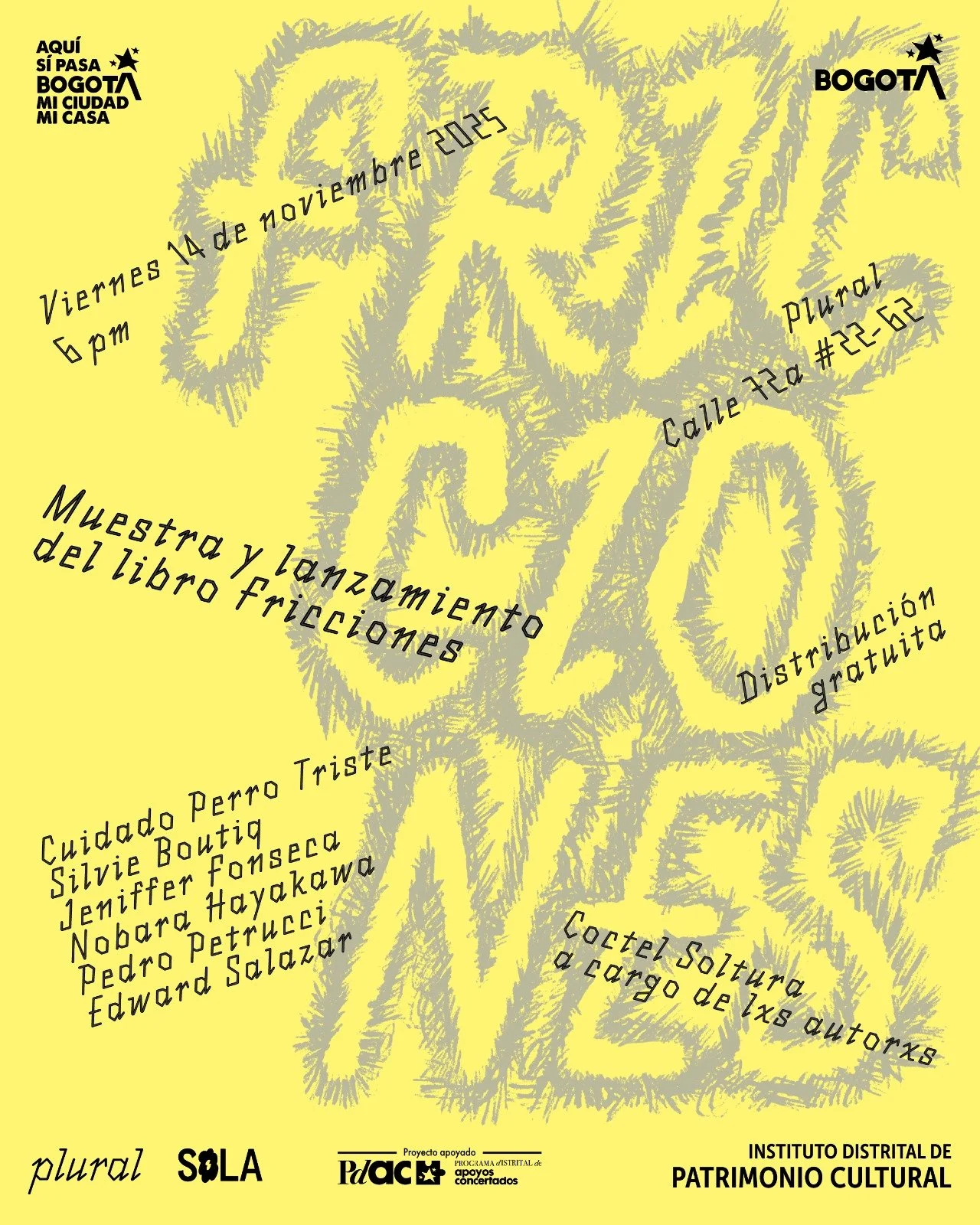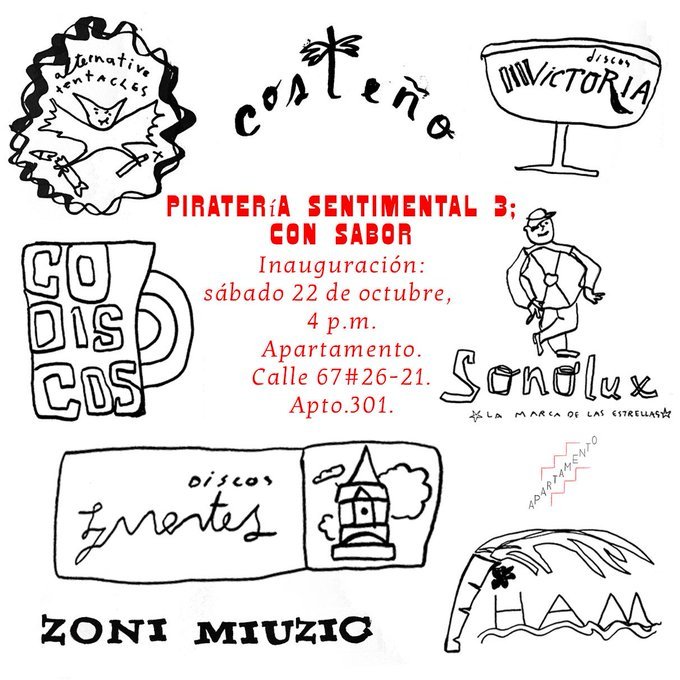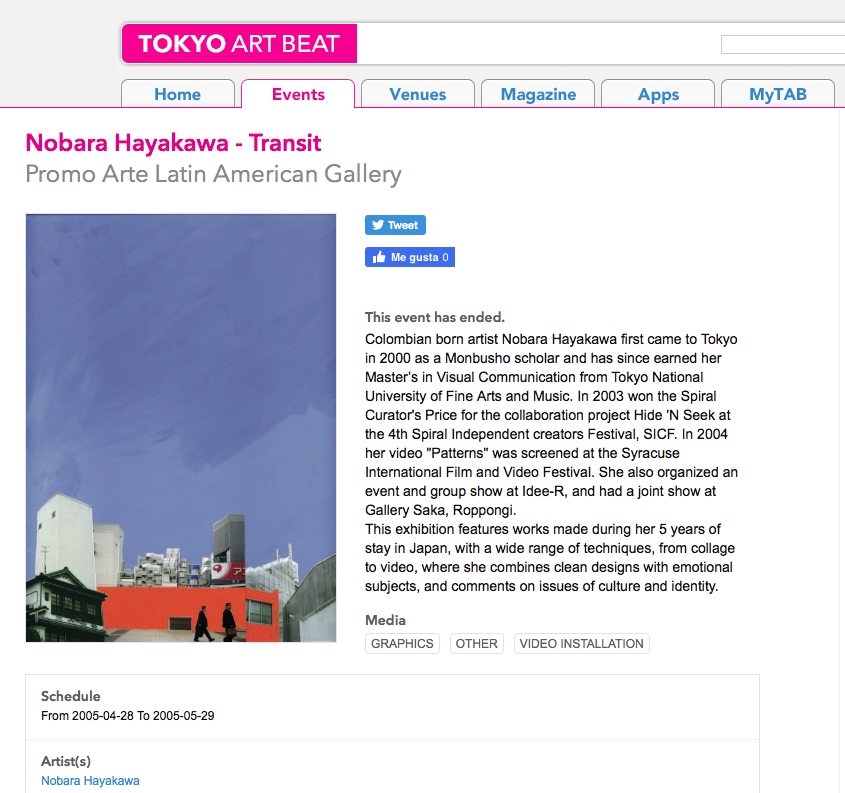Piratería Sentimental 3
Este viernes 11 de noviembre finaliza la tercera muestra de carátulas piratas hechas por 40 artistas invitados por el legendario Humberto Junca en su nuevo proyecto Apartamento 2621. Mauricio Rico, ha$lopablito y yo (con una brevísima participación) tocaremos en vivo para celebrar este encuentro de melómanos. ¡Abierto desde las 6:00pm!
45 SNA / Llamitas al viento
Estaré exponiendo una selección de mis fotos de Bogotá como parte de la curaduría de Manuel Kalmanovitz “Llamitas al viento” (El Parqueadero - Museo del Banco de la República MAMU), y haré dos talleres para niños en el MamBo como parte del programa académico del 45 Salón Nacional de Artistas.
#LOCAL: Una Exposición de Fotografías sobre Bogotá
Estoy haciendo parte de una exposición de fotos sobre Bogotá organizada por Esteban Borrero, Iván Herrera y Ann Kroon. La inauguración es el sábado 20 de octubre, 2018 a las 5:00p.m., la exposición estará abierta hasta el 23 de noviembre, y se puede visitar jueves, viernes o sábados de 3 a 7 de la noche. O cualquier otro día con cita previa.
Calle 67 # 26 - 21 AP 301 Barrio 7 de Agosto, Bogotá
Matera de Materas
La Revista Matera cumple 8 años y 16 números y tiene una exposición muy bonita que logra habitar esa fría caja blanca (que conocemos muy bien) de la Cámara de Comercio, con una nutrida colección de dibujos, pinturas, fotografías, textos, foto-novelas y, cómo no, materas. Allí están expuestas algunas de mis materas del post-antropoceno hasta el 2 de septiembre.
Camisetería Sentimental
Reunidos por la melomanía, varios artistas hemos sido invitados por Humberto Junca, Valeria Giraldo, José Sanín y Carlos Velászquez a participar en esta maratónica impresión de camisetas desde donde pudimos manifestar nuestro amor por la música. Estarán expuestas hasta el 16 de octubre de 2015 en Rat-Trap.
RAT TRAP
Cra. 17 No. 33 - 31
Calendario de Chicas 2015
Lanzamiento del Calendario de Chicas 2015
Sábado 29 de noviembre, 2014
4:00p.m.
NADA
Carrera 6 No. 35- 37 Piso 2, Barrio La Merced.
Bogotá, Colombia.
http://www.nada.com.co/
* concierto * muestra de dibujos *
Adriana Berrío - Natalia Castañeda - Adriana García Galán - Paola Gaviria - Nobara Hayakawa - Noelle Lieber - Maria Isabel Rueda
13th Latin American & Caribbean Contemporary Art Exhibition, TODAY
Exposición colectiva en la Galería de Arte Latinoamericano Promo-Arte, en Tokio.
Resilience Exhibition, Tokyo
Latin American Art Gallery Promo-Arte
Galeria 2F, 5-51-3, Jingumae, Shibuya-ku, Tokyo 150-0001
T. 03-3400-1995
E. info@promo-arte.com
www.promo-arte.com
Access:
Subway Ginza Line, Chiyoda Line or Hanzoumon Line to Omotesando Station, exit B4 or B2. Walk to Shibuya on Aoyama Avenue, turn right at Found MUJI store and proceed straight 100 meters to GALERIA building.
RESILIENCE
by Adriana Salazar
Hayakawa’s paintings and drawings depict elements of the cityscape and landscape in an unfamiliar way. On a certain work’s background, for instance, the skyline of a city is outlined, while above it a large cloud of pollution seems to come to life. The cloud is depicted by means of a single color block, as it stares at the viewer candidly. These strange elements, summed up as the presence of inanimate objects coming to life, predict or mourn the disasters left after the construction of modern cities. They are persistent throughout Hayakawa’s work in different manners: smiling pollution clouds, chopped trees staring in expectation or closing their eyes in meditation, gushes of oil showing their threatening teeth. The faces staring at us from a field or from the top of an anonymous town, are the faces of the anomaly, of something or someone trying to conquer or escape the way landscapes have become in the present.
Más fotos de la exposición en FLICKR
Rafael Pombo Romántico
Rafael Pombo murió hace 100 años pero su legado sobrevive en las más inesperadas formas: la escuela de arte de la Universidad Nacional de Colombia, el imaginario de varias generaciones que crecimos leyendo los cuentos pintados y en esta Feria Internacional del Libro en una exposición que le rinde homenaje a sus múltiples talentos. Tuve el privilegio de participar en este montaje con la sala de poesía romántica (que es casi toda tristísima) haciendo el diseño sonoro, grabaciones de lecturas y composición de canciones de sus poemas.
La exposición conmemorativa para la 25 Feria Internacional de Libro de Bogotá curada y diseñada por Carlos Betancourt también se alojó en la Biblioteca Nacional. Escuche algunas de las grabaciones en soundcloud.
Entrevista en Hartas Artistas
Por Powerpaola, en el marco de las exposiciones itinerantes Hartas Artistas (Frontera Sur - Cali Taller 7 - Medellín y La Residencia - Bogotá).
¿Por qué decidiste ser artista? ¿Cuál es la satisfacción que te trae?
Creo que más que haber tomado una decisión acerca de lo que quiero ser atravieso un lento proceso de liberación de antiguos terrores para abrazar lo que me dice la vida que debo hacer, como una especie de sensación del deber que viene implícita en la oscura certeza de poder hacer algunas cosas. Hago saltos entre las cosas que me hacen vibrar de manera inconsistentemente obsesiva, es decir, con mucha intensidad pero por corto tiempo. En ese sentido, la satisfacción casi nunca aparece, siendo justamente su opuesto lo que me impulsa a tratar siempre otra cosa, algo diferente.
Why did you decide to become an artist? What’s the satisfaction it brings to you?
I don’t think I took the decision to become an artist. It’s been rather a slow process of getting rid of old terrors as I embrace what life’s telling me to do, with a strange sense of responsibility behind the obscure desire to make things. I’ve never had a clear aim. I jump from one thing to another, and attach myself to what I do during very short periods of time but in a very intense way. In this sense, satisfaction hardly appears, for it is precisely the lack of satisfaction what makes me want to try something else, something different.
¿Qué otra cosa pensás que podrías hacer si no fueras artista?
Me gusta la idea de un trabajo donde lo que uno hace ayuda directamente al bienestar de otro. En esta categoría cabrían oficios tan variados como médico, masajista y prostituta.
What would you do if you were not an artist?
I kind of like the idea of serving others, the feeling of usefulness for someone else’s well being. Helping someone feel better would fit for professions as diverse as doctor, masseuse and prostitute.
¿Qué es el arte para vos?
Es como una traducción caprichosa del mundo, donde el traductor genera un mundo nuevo, diferente al que creó la primera experiencia, enriqueciéndolo, y constituyendo a su vez una experiencia primaria para otro ser.
What’s art for you?
It’s like a free translation of the experience of the world, where the translator creates a new one, different from the one where the first experience came from, making it richer (hopefully) as it becomes a primal experience for someone else.
¿Quién te inspira? ¿Por qué?
El mundo y sus habitantes. Es inevitable. Cada ser vivo tiene algo de bonito y cada cosa bonita tiene algo de terrible. Eso me maravilla.
Who inspires you and why?
The world and its inhabitants inspire me. It cannot be helped. Every living thing has something beautiful to it, and every beautiful thing has something tragic as well. I find that wonderful.
¿Cómo es tu proceso creativo?
Se parece a la cocina. Necesito que confluyan varios ingredientes para que funcione la receta, entonces a veces falta algo que hace que el plato sea lo que quiero, o aparece un ingrediente inesperado que lo hace más rico. Así, a veces no tengo ganas de comer pero necesito cocinar, y en el rigor del esfuerzo brota algo delicioso, sin avisar, y el apetito regresa.
How is your creative process?
It’s similar to cooking. One needs certain ingredients to create a specific meal. But at times something might be missing or an unplanned ingredient appears from nowhere, making it all more tasty (as in flavor, not in “the good aesthetics” sense). There’re also moments when one happens to not be hungry at all, but one needs to prepare something all the same, so in the process of making, a delicious smell comes out and it brings back the appetite.
















